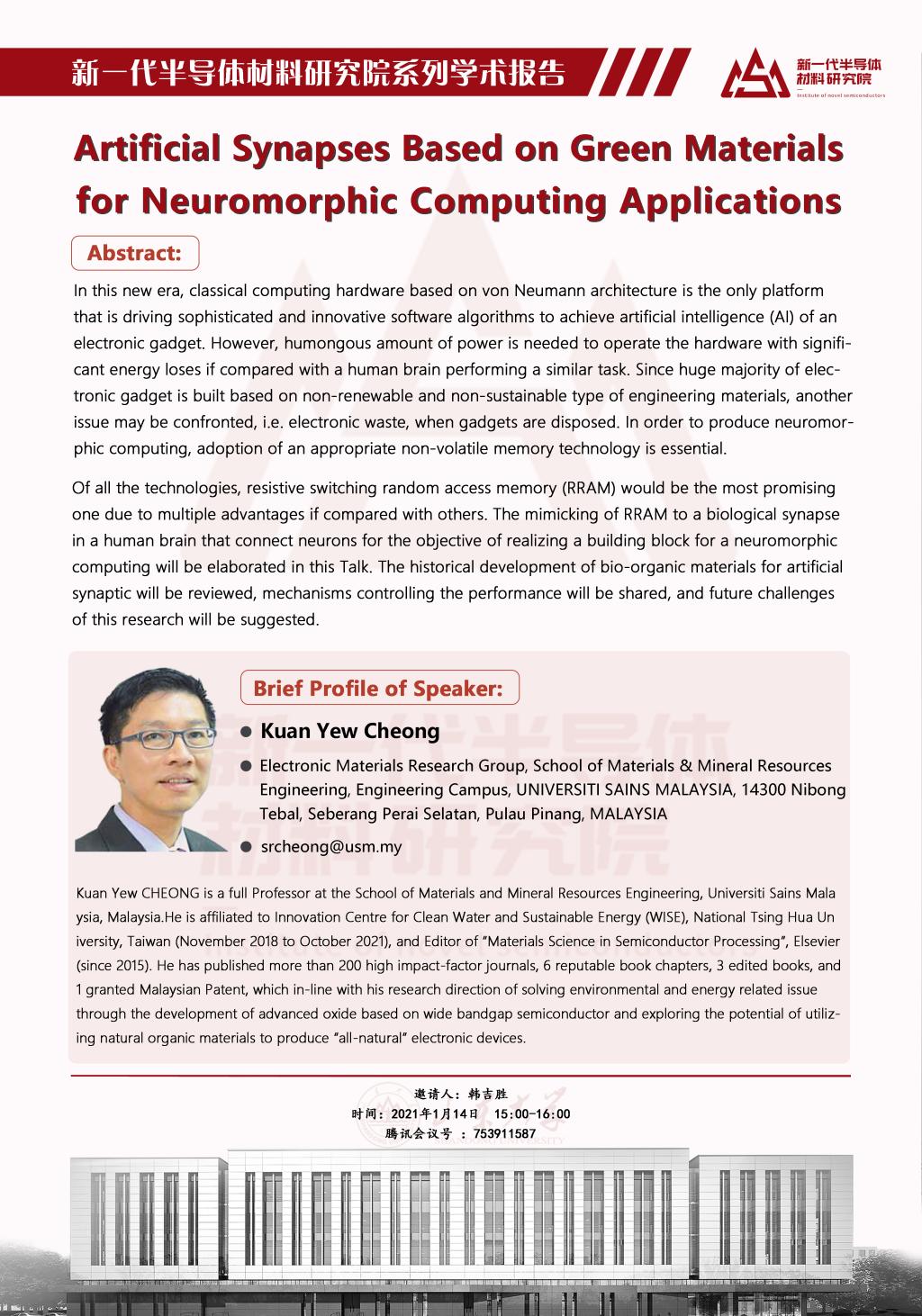
主讲人:Kuan Yew Cheong
时间:1月14日15:00-16:00
地点:腾讯会议号 753911587
Kuan Yew Cheong
Electronic Materials Research Group, School of Materials & Mineral Resources Engineering, Engineering Campus, UNIVERSITI SAINS MALAYSIA, 14300 Nibong Tebal, Seberang Perai Selatan, Pulau Pinang, MALAYSIA
srcheong@usm.my
Abstract:
Huge demand of electronic gadgets with different form factors and applications has been driven by the needs of Internet of Things (IoT) with intelligent gadgets artificially created based on both hard and software. This is the catalyst for industrial revolution 4.0 to be spearheading. In this new era, classical computing hardware based on von Neumann architecture is the only platform that is driving sophisticated and innovative software algorithms to achieve artificial intelligence (AI) of an electronic gadget. However, humongous amount of power is needed to operate the hardware with significant energy loses if compared with a human brain performing a similar task. Since huge majority of electronic gadget is built based on non-renewable and non-sustainable type of engineering materials, another issue may be confronted, i.e. electronic waste, when gadgets are disposed. Even though their development of IoT and AI provide significant advantages to mankind by enhancing connectivity, security, comfortability, productivity, etc., energy waste and electronic waste must be seriously considered during the design stage of those gadgets. One of the strategies to simultaneously overcome these two issues is by replacing energy wastage of von Neumann based architecture in hardware computing with more energy efficient brain-like (neuromorphic) computing and replacing non-sustainable type of engineering materials to produce the hardware with bio-organic based materials that can be derived from plants, living, or once living things. In order to produce neuromorphic computing, adoption of an appropriate non-volatile memory technology is essential. Of all the technologies, resistive switching random access memory (RRAM) would be the most promising one due to multiple advantages if compared with others. The mimicking of RRAM to a biological synapse in a human brain that connect neurons for the objective of realizing a building block for a neuromorphic computing will be elaborated in this Talk. The historical development of bio-organic materials for artificial synaptic will be reviewed, mechanisms controlling the performance will be shared, and future challenges of this research will be suggested.
Brief Profile of Speaker
As a passionate researcher, educator, trainer, consultant, and Professional Engineer of material science and engineering for more than twenty years, Kuan Yew CHEONG is a full Professor at the School of Materials and Mineral Resources Engineering, Universiti Sains Malaysia, Malaysia. Prof. Cheong served as a Commissioned Senior Scientist at Korea Electrotechnology Research Institute (2004, 2006), Adjunct Associate Professor at Multimedia University, Malaysia (2012), Visiting Lecturer at Universiti Malaysia Perlis (2012), Malaysia, Visiting Professor at National Taiwan University (2018), MIMOS Semiconductor Sdn Bhd (2018), and Technical Advisor for NTG Innovation Pte. Ltd., Singapore (January – December 2019). Now, he is an External Examiner for Wawasan Open University (Malaysia), INTI International College Penang (Malaysia), affiliated to Innovation Centre for Clean Water and Sustainable Energy (WISE), National Tsing Hua University, Taiwan (November 2018 to October 2021), Technical Consultant of failure analysis for MIMOS Semiconductor Sdn Bhd (Malaysia), and Editor of “Materials Science in Semiconductor Processing”, Elsevier (since 2015). He has published more than 200 high impact-factor journals, 6 reputable book chapters, 3 edited books, and 1 granted Malaysian Patent (MY-153033-A), which in-line with his research direction of solving environmental and energy related issue through the development of advanced oxide based on wide bandgap semiconductor and exploring the potential of utilizing natural organic materials to produce “all-natural” electronic devices. As a registered Professional Engineer (Board of Engineers, Malaysia), a “Top Research Scientists Malaysia (TRSM) 2013 - 2022” (Academy of Sciences Malaysia), and a Certified Professional Trainer (Ministry of Human Resource, Malaysia), Prof. Cheong has delivered more than 300 technical training courses to various local and multinational industries and has resolved many industrial cases related to processing of electronic materials both wafer and package levels. Currently, Prof. Cheong is a Fellow of The Institution of Engineers Malaysia (IEM), Senior Member of Institute of Electrical, Electronic Engineers (IEEE), a Principle Interviewer for Professional Interview of IEM and Senior Evaluation Panel of Engineering Program Accreditation under Engineering Accreditation Council, Malaysia.
